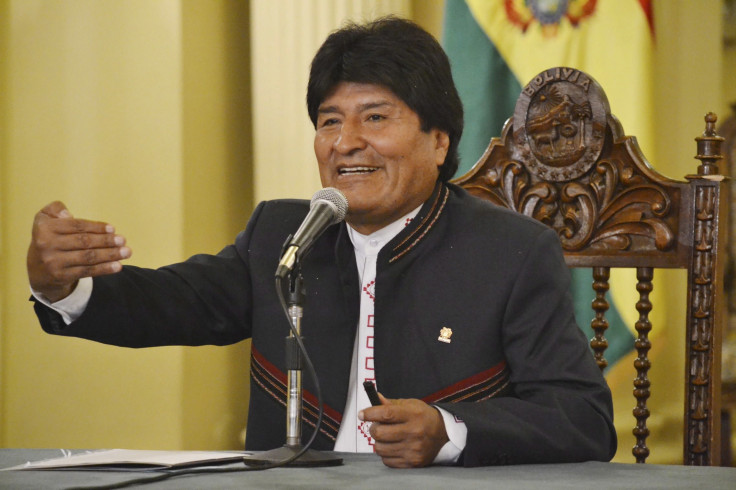Bolivia Stirs Debate Over Eliminating Term Limits For Evo Morales

Bolivian President Evo Morales is one of the most popular leaders in the world, with an approval rating around 75 percent. He’s also on track to become the country’s longest-serving president, after securing an unprecedented third term in office in October. Now some of his Socialist supporters are hoping to extend the party even longer.
Members of Morales’ Movement for Socialism (MAS) party are pushing for constitutional changes that would abolish presidential term limits and potentially allow him to run for re-election indefinitely. Morales’ current term doesn’t end till 2020, but rumblings of a potential change to term limits are already generating heated resistance from opposition politicians.
Some members of MAS have already assigned a political commission to work toward Morales’ re-election in 2020, the party’s regional chief in Cochabamba, Leonardo Loza, told news agency Efe last week. The constitution mandates that Morales can’t run for president after his current term ends. But some in the party aim to draft a referendum to change those rules.
Senator Nélida Sifuentes, speaking with Bolivia’s El Día, said Morales remained the party’s best candidate. “Comrade Evo asked us to search for other leaders. We have done it, and we haven’t found any,” she said. “Our only leaders are comrade Vice President Álvaro García Linera and [Morales].”
Technically, Bolivian presidents are supposed to have only two terms. In 2013, a court ruled that a constitutional rewrite during Morales’ first term effectively reset the cycle, allowing him to run for a third term last year. He won by a landslide, with 60 percent of the vote compared with 25 percent for his top challenger, Samuel Doria Medina.
The idea of a third term for Morales was already controversial, and unsurprisingly, Bolivia’s opposition is swinging fiercely against the idea of allowing him another. “The third term was already illegal,” Arturo Murillo, head of the opposition Democratic Unity bloc in the Senate, said last week, according to Bolivia’s El Deber newspaper. “Now they want us to have a fourth? We won’t allow that. We are against totalitarianism and the caudillos [political-military dictators] that want to perpetuate themselves in power.”
Morales said he hasn’t decided whether he’ll opt for a fourth term. “I said I will comply with the constitution, as well as the will of the people,” he told local reporters at a press conference Tuesday. “I still haven’t made any decisions. Right now I’m too busy organizing departmental caucuses.”
But Miguel Centellas, an assistant professor of political science at Jackson State University who has specialized in Bolivian politics, said it’s clear Morales fully intends to run again.
“It’s an inevitability,” Centellas said. “He wants to be re-elected, there’s no doubt about that. Since he ran for election in 2009, it was very clear that he was just going to keep running.”
Although any potential re-election wouldn’t happen until 2020, Morales still holds enough popular support that a fourth term wouldn’t be surprising. During his presidency, Bolivia has seen stark improvements in living standards and unprecedented poverty reduction. Bolivia also now is among the fastest-growing economies in the region, while its Latin American neighbors are going through painful slowdowns. At the same time, opposition members have accused him of eroding democratic checks and consolidating his own power.
It’s unclear at this point if there’s enough public support for a potential referendum on changing the constitution. There are obvious concerns about what ramifications such constitutional changes would have on presidents in a post-Morales era, but Morales’ cult of personality could still outweigh those fears, Centellas said.
“Unfortunately, the public is much more interested in the past than the future in terms of how they think politically,” he said.
Meanwhile, Bolivia isn’t the only country where term limits are being debated. In Ecuador, President Rafael Correa -- whose approval ratings mirror those of Morales -- is also pushing constitutional reforms to eliminate presidential term limits. In Venezuela, late leader Hugo Chávez did away with term limits through a referendum approved in 2009.
But relying on one charismatic leader at the expense of building up political institutions is worrisome for Centellas. “At some point, Evo Morales will die. That is a human inevitability,” he said. “And Venezuela is a really good lesson in not being prepared to have an ordered succession, and not having a party that is institutionalized beyond the memory of a man.”
© Copyright IBTimes 2024. All rights reserved.





















